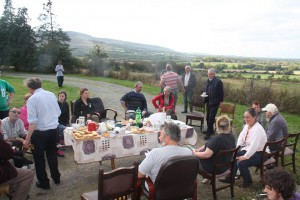Organic Growing and Sustainable Living Skills
- One year full-time Quality and Qualifications Ireland (QQI) Level 5 Course where you choose your modules leading to a certificate in Horticulture
- You’ll develop organic gardening skills so you’ll be able to grow fruit, veg and herbs the healthy organic way
- Part time and Distance Learning options are also available
Leading to a QQI Level 5 Certificate in Horticulture.
One Year full-time course. (Part time options available)
This course is one of only a few like it in Ireland and runs from mid September to late May. It features lectures, demonstrations and group discussions, field trips and tours.
The course consists of modules, some of which are nationally written and common to other Education bodies under Quality and Qualifications Ireland (QQI). Many of the modules have been specially written by teachers within the Organic and Co-operative movement. Because it is modular based and nationally certified, students wishing to continue to study further can have their awards recognised at whatever level achieved.
The Modules included in this course are as follows:
Organic Standards and Principles (5N2550)
This modules covers all the basics you’ll need to know about growing crops organically in Ireland – this is especially useful if you are aiming to sell organic certified produce with a symbol.
When you successfully complete this module you will: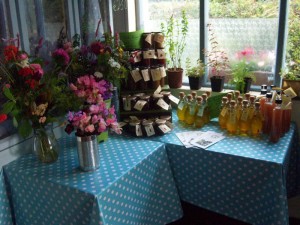
- be familiar with organic principles and practices
- be aware of regulations and standards in the field of organic production
- appreciate the role of organic food production within the wider environmental movement
- have acquired skills in propagation, cultivation, and harvesting of food crops organically
- appreciate the organic approach to the control of soil fertility, weeds, pests and disease.
An important part of the module is the project where you grow a crop in your garden.
Topics on Organic Production Principles include:
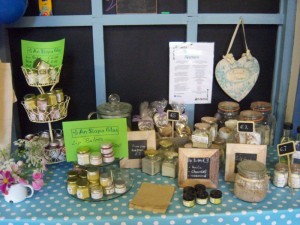
- The history and principles of organics
- Organics in Ireland
- Benefits of organic methods
- Organic organisations
- Organic standards
- Seed saving
- Rotations
- Converting to organics, farm inspection and record keeping
- Financial assistance for organic producers
- Weed and pest control
- Local food, marketing, farmers markets and box schemes
Fruit and Vegetable Production (5N2552)
This module goes into the detail of how to grow specific fruit and vegetable crops organically. Together with Soil Science and Growing media it gives you a sound introduction to organic growing. It specifically recommends the best techniques and varieties for growing in Irish conditions.
When you successfully complete this module you will:
- be capable of preparing and cultivating a site suitable to food crop production
- have acquired skills in propagation, cultivation and harvesting of food crops
- be capable of selecting weed, pest and disease control measures appropriate to specific situations
After completing this module you will have acquired the skills necessary to grow and harvest your own vegetables throughout the growing season.
Topics include:
- Planning, ground prep, yield and year round supplies
- Overwintering crops
- Protected cropping: growing in polytunnels and under cover
- Rotations and the vegetable families
- Seeds and seedlings
- Successional sowing
- Fruit and orchards
- Harvesting, storing, eating, cooking and selling!
Soil Science and Growing Media (5N2530)
The soil is the most important part of an organic system (except for you)! Organic growing begins and ends with the soil – it’s critical to everything we do – by developing a healthy soil you’ll find you grow healthier crops and that the work of gardening gets easier. This module will give you the skills to understand your soil and how to improve it.
Understanding the soil and fertility is crucial to becoming a good organic grower.
When you successfully complete this module you will be:
- be familiar with the origins, characteristics and properties of
- be capable of manipulating the properties of soil to support crop production
- appreciate the importance of the practices and requirements of soil nutrition and cultivation for organic crop production
- care and foster a respect for the environment as a finite resource.
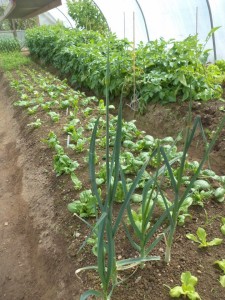
Topics include:
- Soil origins profiles, and Soil Types
- Soil drainage and erosion
- Soil water, air and temperature + Irrigation
- Soil nutrition and soil pH and liming
- Nitrogen cycle and nitrogen fixation
- Soil Ecology
- Organic matter
- Cultivation, Dig and no dig
- Compost
- Organic manures and fertilisers
- Green manures
- Mulches
- Soil-less growing media and liquid feeds
Beekeeping (5N2554)
This module will allow students to become novice beekeepers, giving them all the information they need to set up and maintaining an apiary, to understand the year in the honeybee colony and the annual cycle of work in an apiary. It also covers the importance of:
- site selection
- legal methods of sourcing bees within Wildlife Act
By way of theory classes and hands on work on the Organic College’s six beehives The students will identify, through visual inspection, the stages of bee development, different bee types, comb and brood health.
The students will also learn about the common plants used by bees for pollen and nectar and how to ensure a near year round natural food supply as well as how and when to supplementary feed.
Health and safety in beekeeping will be dealt with in detail for both beekeeper;
- the possible effects of honeybee stings on humans and methods for treating them,
- select a range of personal protective equipment, maintain it safely and hygienically and
- procedures to create and maintain a safe working environment including safety standards regarding lifting, carrying and handling plants, tools and equipment.
And bees;
- the threats to a bee colony
- recognising the symptoms of common bee bacteria, viruses, fungi and parasites
- methods for dealing with bee disease
During the year students will have the opportunity to
- assemble a frame,
- use hive tools,
- manage the beehive through the year as well as
- extract honey and beeswax from combs safely and hygienically, including straining and bottling of honey.
Plant Protection (5N2546)
This module goes hand in hand with learning to grow your own organic vegetables.
Part of being a successful gardener is learning how to protect your plants from pest and
disease. After completing this module you will have the knowledge and competence to
identify a wide range of weeds, plant pests, diseases, disorders and the control measures
appropriate to protect your plants from their devastating effects.
Topics for Plant Protection include:
- Characteristics of common plant pests including insects, other arthropods, molluscs, nematodes, birds and mammals
- Characteristics of disease causing agents including fungi, bacteria and viruses
- Characteristics of the causal agents of non-pathogenic plant disorders
- Identification of a wide range of horticultural pests and diseases including their symptoms, type of damage and control measures
- Effects of reproduction, spread and control of weeds on an organic holding
- Dangers associated with the use of synthetic pesticides and herbicides
- Correct application and storage of natural pesticides and herbicides
Plant Science (5N2528)
In order to grow plants well it is crucial to have a good understanding of how they grow. This module covers basic botany as it applies to organic growing. You’ll be amazed how much easier it is to care for your plants once you understand how they grow. You’ll know more about when to water them, how best to care for them and their nutritional needs at different points in the life cycle.
When you successfully complete the Plant Science module you will:
- have acquired a broad knowledge and understanding of plant structures, growth and development
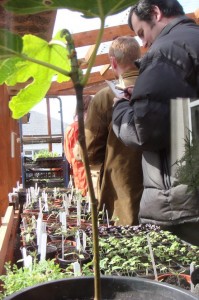
- be familiar with the basic living processes of plants and their relationship with environmental factors
- acquire skills of observation, investigation and recording
- be familiar with the characteristic features of a wide selection of plant life
Topics for Plant Science include:
- Classification of plants
- Plant Cells
- Plant Structure: roots and stems, leaves and flowers
- Plant transport systems, Respiration and Transpiration
- Plant Life cycles and Reproduction
- Plant hormones
- Genetics and DNA
Plant Identification and Use (5N2527)
This module will give you the knowledge of identifying a wide variety of trees, shrubs and other plants. You will also be able to recognise them by their botanical / Latin names.
You’ll learn how to select appropriate plants for different conditions and be able to plant in a variety of situations. Developing a basic knowledge of what plants are around you and what their names are so you can communicate with other growers is very helpful for all growers.
When you successfully complete this module you will:
- be capable of identifying a wide variety of trees, shrubs and other plants
- be familiar with the characteristic features of a wide selection of plants
- be capable of selecting appropriate plants for different situations
- demonstrate ability to plant in a variety of situations
- be familiar with techniques used to control weeds, pests and diseases.
Topics for Plant Identification include:
- Botanical names and plant nomenclature
- Plant parts and names
- Trees
- Weeds
- Vegetables, Herbs and Fruit
- Wild Flowers
- Planning a garden
Applied Permaculture (5N1553)
This module will introduce the student to the fundamental principles behind Applied Permaculture, where natural ecosystems are taken as the model for human habitat and landscape design. Practically based the student will learn the basics in ecological building design and natural building methods, water management and basic aquaculture systems, designing sustainable woodlands, forest gardens and intensive food gardens as well as the application of permaculture to broad-scale agriculture. The student will through the course of the year learn how to produce a permaculture design for a property and will develop hands on skills appropriate to sustainable living.
Learners will be able to:
- Investigate ways in which permaculture can contribute to the ‘greening’ of local communities
- Explore the principles and ethics of permaculture
- Examine the relationship between organic gardening, bio-dynamics and permaculture
- Distinguish between the range of sustainable building materials and techniques
- Explore the principles of green design
- Examine how permaculture principles can be applied to broad scale agriculture
- Summaries the importance and potential of aquaculture in a permaculture system
- Explore the range of potential uses for a well designed woodland
- Interpret the principles of permaculture in the context of a food garden
- Comment on a range of techniques and practices appropriate to an intensive food garden
Horticultural Mechanisation (5N2559)
The purpose of this award is to equip the learner with the knowledge, skill and competence to operate and maintain a range of hand and powered horticultural machinery and implements and also how to use them efficiently in Crop Production.
Communications (5N0690)
Communication skills are highly valued in the workplace but this module extends beyond exclusively vocational needs, recognising that the acquisition of these skills is a life-long process, and central to personal, social and professional development and fulfillment.
This module is a requirement for all QQI courses and should be taken if you are completing the full certificate. You will need to do a presentation, write sample letters and create other forms of visual communication.
This module does not normally require too much work and you will complete it quite quickly.
- The written word
- Non-verbal communication
- Interpersonal communication
- The Spoken Word (listening, speaking, dialogue)
- Interviews
- Giving Presentations
- Groups and meetings
- Communication technology (phone, computers)
- Mass Communication – the media
Work Practice (5N1433)
If you wish to complete a full certificate you will need to complete work placement on an organic horticultural holding of your choice. This can be with a grower or organisation that is near to you or of interest to you. We have contacts with some of the best organic growers in the business and can help with a choice of host.
You will also need to keep a garden diary based on work you do at your own garden, during practical days at the college and farm walks or gardens visited throughout the year.
Keeping a garden diary is good practice for all gardeners and we encourage students get in the habit of doing this during the first year – you’ll then have already completed some of the work Practice module before starting year two. Another good time is over the summer when there is plenty going on at farms and gardens. You will need to take photos and notes of what you did and hand in a report on how the placement went.
I want to find out more
Register your interest using this form and we’ll send you more information.
Or there are more details on the main course page.
